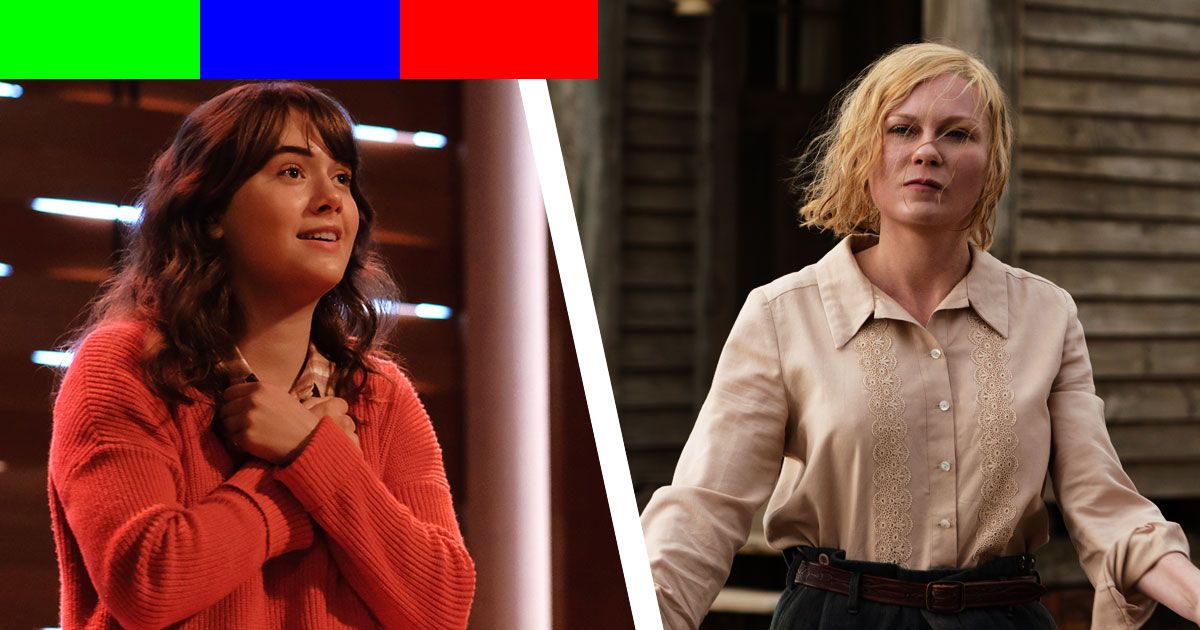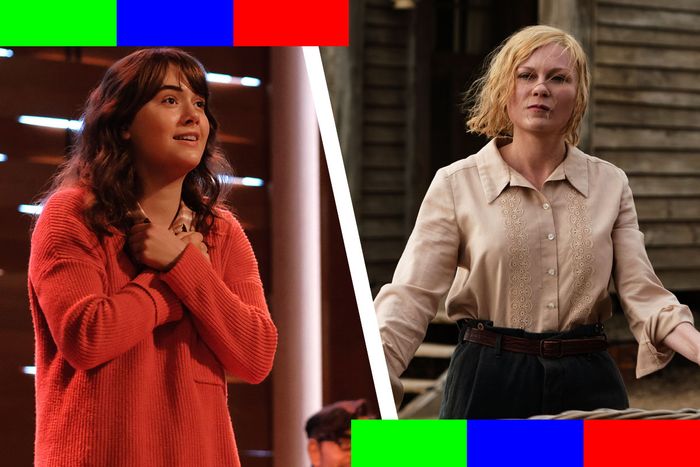
What’s at Stake for the Streamers at the Oscars

Apple’s Coda; Netflix’s The Power of the Dog.
Photo-Illustration: Vulture. Photos: Apple; Netflix
It’s been five years since Prime Video’s Manchester by the Sea became the first made-for-streaming movie to snag an Academy Awards nomination for Best Picture — and yet so far, no streamer has managed to go all the way and capture Hollywood’s highest honor. If you believe most Oscars forecasters, that will almost surely change this weekend, with either Apple TV+’s CODA or Netflix’s The Power of the Dog now considered the prohibitive favorites to be the last film standing when the final winner is announced. But while execs from both streamers desperately hope their movie comes out on top, Apple is the only platform guaranteed to emerge as a clear winner of awards season no matter what happens Sunday.
The reason the tech giant need not sweat the outcome of the Best Picture race is in part a simple matter of expectations. Netflix has spent a half-decade and upward of a billion dollars trying to disrupt the Oscars the way it reinvented television, and after several close calls with titles such as Roma and The Irishman, Jane Campion’s instant classic (at least in the eyes of many critics) looked until recently to be the film that finally toppled that last big awards barrier separating movies made for theaters and those for streaming. And it still very well might! But losing out to a small film from a much younger platform would be a crushing (though, let’s be real, not fatal) blow to the collective Netflix ego. And as my colleague Nate Jones told me this week when we chatted on Slack, a loss would likely prompt some serious soul-searching at the highest levels of the company. “I think it could be the end of their ‘Let’s give a blank check to a major director and hope to win an Oscar’ strategy’,” he told me. In other words, the stakes for Netflix are incredibly high, and the ramifications of a “defeat” are likely to be widespread within the company.
By contrast, consider what Apple has already accomplished with its decision to spend $25 million to acquire CODA back at Sundance last year:
➽ Between end-of-year top-ten lists and the steady drumbeat of awards nominations and wins, the last four months have generated a massive amount of free, almost universally positive PR for CODA, and by default, Apple TV+. Obviously most ordinary consumers aren’t paying close attention to the ups and downs of the Oscars race, but these wins have yielded hundreds of feature stories and TV appearances, plus the expected amount of social-media buzz reacting to the victories. And while journalists and marketing execs might not love the never-ending awards season, the fact that it goes on (and on and on and on) works to Apple’s benefit: All this earned media has been rolling out since the holidays rather than in one concentrated burst. The $25 million Apple spent to buy CODA is the rough equivalent of four Super Bowl ads, but unlike the marketing high generated by advertising on the big game, the Oscar season buzz doesn’t disappear after a few days. Plus, Apple has wisely made sure consumers checking out the platform for CODA have plenty of other title to keep them in the ecosystem: The pace of new series premieres has picked up since the start of the year, with big new shows (Severance, The Last Days of Ptolemy Grey, Pachinko) rolling out every two to three weeks.) The old slam against Apple TV+ —“There’s hardly anything to watch” — just isn’t true anymore.
➽ Apple makes Netflix look chatty when it comes to sharing audience metrics, so we have zero idea how much the awards love for CODA has led to a spike in subscribers or increased viewing of the actual movie. But I’d be willing to bet it has mattered quite a bit. CODA is a very accessible crowd-pleaser of a movie and boasts a well-known co-star in Marlee Matlin; the attention around it isn’t a case of media elites talking about something while the rest of America snoozes. Early social-media love for Ted Lasso ultimately translated into increased audience demand, and I’d be shocked if the same won’t hold true for CODA, particularly after Sunday.
➽ CODA has proven Apple can play with the big kids when it comes to marketing and distributing an awards season movie. To be sure, this isn’t quite as big a deal as it was five years ago, when Netflix and Amazon’s Prime Video pioneered streaming movies as awards contenders. Apple also isn’t some tiny underdog desperate to get noticed: It can clearly spend what it takes to hire top-notch awards sherpas. I’ll leave it to experts, such as my colleague Nate, to assess just how much of CODA’s kudos success can be chalked up to the skills of Apple’s awards team versus voters simply finding the movie and loving it. But how such campaigns are run does matter, as do results. And while most agents and talent are primarily interested in how big a check platforms are willing to write, knowing their movie will get a proper push (among both viewers and awards voters) counts, too. Apple hasn’t had a problem getting A-list talent to commit to film projects up until now, but if CODA results in a few more sought-after projects landing at the streamer, then that’s another win for the service.
I don’t want to overhype CODA’s awards success thus far or Apple’s awards track record in general — particularly compared to Netflix. Power of the Dog landed more noms than any other movie this year (12), and Netflix’s 27 noms led all studios and platforms. Apple, of course, had far fewer original movies in 2021 than Netflix, and CODA was never going to rack up a massive nom tally (nobody is giving it awards for costumes, visual effects, or makeup). But one good movie does not mean Apple’s fledgling film division is suddenly on par with Netflix or even Amazon’s Prime Video, at least not yet. For all the slow-building success of CODA, it’s worth noting the streamer hasn’t really gotten much attention for pics such as Cherry, Finch, or Swan Song, despite some big stars and often positive reviews. And while there was a lot of critical and awards love (including three Oscars noms) for Denzel Washington’s The Tragedy of Macbeth, it hasn’t had nearly the breakout success of CODA (or POTD). In other words, for all its success, Apple’s entry into moviemaking has not been without bumps.
And once again, the fact that Apple is scoring big wins with CODA does not mean that Netflix is somehow on track to be a “loser” this awards season. Even if it doesn’t get the top prize, POTD still delivered every bit as much positive PR for Netflix as CODA did for Apple, and it was much more successful dominating the cultural Zeitgeist in recent weeks (thank you, Sam Elliott). What’s more, while its overall nomination tally was down from last year (when it landed 36 noms), the fact that Netflix still led all studios in overall nominations reaffirmed what we’ve known for five years, which is that the streaming giant is capable of delivering Oscar-caliber movies that resonate. If POTD and the other big Netflix contenders (Don’t Look Up; The Mitchells vs. the Machines; Tick, Tick … Boom!) have a good night Sunday, Netflix’s triumph will easily outshine the success Apple has had to date. I can absolutely envision a scenario where the story of this year’s Oscars is that of an ascendant Netflix, with CODA becoming a mere, well, coda.
But if it’s a night of upsets and POTD doesn’t take Best Picture, there could be repercussions of the sort we won’t see if Apple goes home empty-handed. As Jones noted, a bad showing could prompt Netflix to stop throwing cash at directors in hopes of chasing Oscar gold. It might instead opt to funnel even more money into making popcorn fare such as The Adam Project or Red Notice, or it might redirect the monies it spends on prestige films to low-budget titles more efficient at delivering big viewing tallies. Or Netflix could decide to further expand its already impressive international production pipeline and make more movies in territories outside the U.S. and Europe in places where there’s more potential to generate subscriber growth. (We’re already seeing evidence of this shift away from the U.S. on the series side.) While several Netflix international titles have done well in the U.S. and Europe, I’m sure Ted Sarandos would love to find the feature film equivalent of Squid Game. World cinema might be a better investment for Netflix than writing blank checks to Hollywood royalty.
In any case, whatever transpires on Oscar Sunday — whichever streamers gets tagged a “winner” or “loser” by obsessively analytical types like yours truly — keep this in mind: The final results are unlikely to move the needle in the overall streaming wars much more than a few millimeters. A few hours after the last after-parties wrap up, execs at both platforms, along with their counterparts at the other streamers, will go back to work in the content factories, where the job will remain the same as it was the day before: spending insane amounts of cash on movies and TV shows in the hope of attracting more subscribers and capturing more viewing time.
The actual Oscar race has been overshadowed somewhat in recent weeks by the (completely predictable) backlash against the changes being made to the show by ABC and the Academy. I’ll reserve judgment on the wisdom of these adjustments until I see how they actually play out and whether the assurance that most folks won’t be able to notice them turns out to be accurate. But this much I do know: A lot is riding on how this year’s Oscarcast performs in the ratings. The 2021 show barely made it to 10 million viewers (down from 23.6 million in 2020) and was easily the least-watched televised Academy Awards ever. But it was also a COVID-era anomaly — without a massive studio audience and very little of the joy and energy of a usual Oscars. The ratings collapse was shocking but not entirely surprising.
Sunday’s broadcast will basically be a return to normalcy, with big musical numbers (including Beyoncé) and all the usual glitz and glamour. If it somehow comes in below last year’s Nielsen benchmark, well … let’s just say there will be many emergency meetings among ABC and Academy execs. Odds are there won’t be another decline; a ratings spike of at least a few million more viewers seems far more likely. An Oscars that ends up averaging 12 or 13 million viewers would hardly be a triumph, however. The show’s 2020 audience marked a record low, so coming in at barely half that level two years later would still be pretty awful, even in this era of perpetual ratings declines. Best-case scenario? The show lands at around 17 to 18 million viewers, putting it in the same ballpark as Oprah’s interview with Harry and Meghan last March. I am not about to offer a prediction on where the numbers will end up, but I do think a surprise on the upside is more likely than further erosion, even if that still leaves Oscar a shadow of its former self. Maybe “not a total disaster” is the best anyone in network TV can hope for these days.
